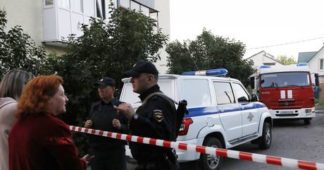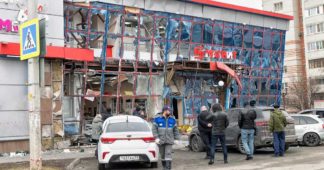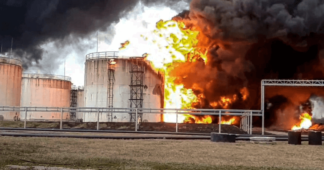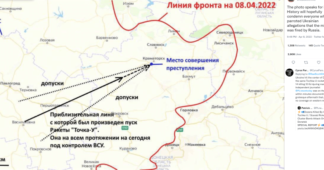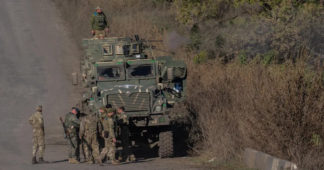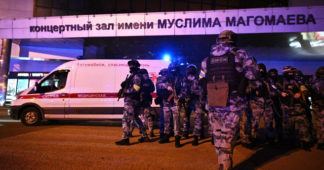By Jason Melanovski, Clara Weiss
Mar 28, 2024
In the wake of Friday’s terror attack at the Crocus City Hall near Moscow, which has claimed at least 143 lives, the Ukrainian military has escalated its shelling of the Russian city of Belgorod.
According to Belgorod local Governor Vyacheslav Gladkov, five civilians were injured after the region came under attack from over dozen rockets early Tuesday morning.
Later in the day, the Russian Defense Ministry confirmed they had repelled an “attempt by the Kiev regime to carry out a terrorist attack” using Czech-supplied RM-70 Vampire multiple rocket launchers and claimed that 13 projectiles had been destroyed in mid-air.
The most recent attack was preceded by a series of rocket strikes in Belgorod during the Russian presidential elections that killed at least five civilians and forced the closure of schools and shopping malls. During the election itself, Russian neo-Nazi militias, backed by Ukraine and NATO, launched an incursion into Russian territory. It was the first attack on Russian territory involving tanks since the defeat of the Nazis by the Red Army in World War II.
As the war situation has continued to rapidly deteriorate for Ukraine at the front due to a severe manpower and ammunition shortage, it has conversely intensified its missile and artillery attacks on Belgorod. The city lies only 25 miles east of the Ukrainian border.
Just prior to New Year’s Eve, shelling from Ukrainian forces killed 25 people celebrating the holiday and injured more than 100. Another strike in mid-February killed seven people and injured 20. Last week, Russia announced the evacuation of 9,000 children from the region, and Russian media reports suggest that people are increasingly fleeing the area on their own.
In retaliation, Moscow recently carried out a series of large-scale bombardments against Ukraine, damaging critical infrastructure, such as the Dnipro Hydroelectric Power Station, cutting electricity to tens of thousands of Ukrainians.
Later on Wednesday Russia struck the Ukrainian city of Kharkov (Kharkiv) with aerial bombs for the first time since 2022, reportedly killing one and injuring 16 others.
Kharkov, a Russian-speaking city of over a million, is located just 46 miles from Belgorod and is expected to be targeted this summer in a new Russian offensive. According to the pro-Western Russian news outlet Verstka, the Russian military is planning to amass a force of 300,000 to encircle the city which previously served as the capital of the Ukrainian Soviet Socialist Republic until 1934.
The US has remarkably quickly moved on from the Moscow terror attack, limiting its coverage almost entirely to denunciations of Putin’s so-called “paranoia” about the involvement of the US and Ukraine in the attack. However, political developments and the findings of the investigation by Russian authorities point to precisely such involvement.
The four men arrested were all immigrants from a region in Tajikistan which borders Afghanistan. The Islamic State Khorasan Province (ISIS-K) is known to have been particularly active in that region, and it is also known to have been effectively a creation of the United States. Meanwhile, the head of the Russian secret service FSB, Alexander Bortnikov, has claimed that Ukrainian Secret Service (SBU) had trained militants in the Middle East and pointed to the substantial number of Islamist militants fighting on the side on the Ukrainian Armed Forces.
The latter fact has been known for some time and was reported last year by the New York Times and in recent days by the German media. Activities of the Ukrainian secret service in the region are also highly likely. The Ukrainian ambassador to Tajikistan, Yevdokymov Valerii, is the former head of foreign intelligence of Ukraine (2019-2020) and worked in the Special Operations offices in 2022 until his appointment to the embassy in Tajikistan later that year.
Meanwhile, terrorist attacks on Russian soil and Russian-occupied parts of Ukraine are an all but official component of Ukraine’s war strategy.
In September, in the wake of the massive failure of its summer counteroffensive that claimed the lives of over 100,000 Ukrainian soldiers in just a few months. Zelensky’s presidential adviser Mykhailo Podolyak announced in an interview that “this is the stage of the war … when hostilities are gradually being transferred to the territory of the Russian Federation.” He threatened that Ukraine would ramp up strikes on Russian-occupied areas, as well as inside Russia itself, carried out by “agents” or “partisans.”
On March 26, four days after the Crocus City Hall attack, the head of Ukraine’s Secret Service SBU, Vasily Maliuk, responded to a question by a journalist about a series of assassinations and terror attacks on Russian authorities in the occupied territories. “The question is exactly on point. We will not officially recognize this in any way, but at the same time, I am ready to disclose the details to you.” His statement was reported by the Russian state outlet Izvestiia as a “de facto acknowledgement” of Kiev’s responsibility for Friday’s terror attack.
In yet another development that went virtually entirely unreported in the US media, the Turkish government has arrested at least 147 suspected militants of the IS in 30 cities across the country on Monday and Tuesday. Combined with another police raid on Sunday, Turkish authorities have arrested at least 211 people since the attack on the Crocus City Hall. Both Russian and Turkish media have reported that two of the alleged perpetrators of the attack had stayed in Turkey for several weeks between mid-February and early March.
While Turkey has maintained ties with Moscow, its increasingly close military ties with Ukraine and its sale of Bayraktar aerial drones to Kiev rapidly escalated tensions prior the start of the war in February 2022.
The Moscow terror attack has also been followed by another major shake-up at the top of Ukraine’s military and intelligence leadership. On Tuesday, Zelensky announced the surprise dismissal of Oleksiy Danilov, the secretary of Ukraine’s National Security Council. Danilov will be replaced by Oleksandr Lytvynenko, who formerly led Ukraine’s foreign spy agency. Danilov was one of the few remaining high-ranking figures in intelligence who had occupied his position since 2019, when Zelensky came to power.
The reasons for Danilov’s unexpected dismissal have not been revealed. Zelensky simply called the dismissal another part of the “reboot of our state’s governance system,” which has included of the ouster of substantial portions of the country’s military leadership, including of his former commander-in-chief and political rival Valery Zaluzhny.
Danilov was notorious for racist statements, and his firing came after he insulted Chinese Special Representative for Eurasian Affairs Li Hui on Ukrainian television and ridiculed the Chinese demand to include Russia in any peace negotiations.
“As for Li Hui, I want to remind everyone: No one will decide our fate but us,” Danilov said. “I don’t understand who can trade our territories, our lands like that. Because some Hui, I’m sorry, or whatever his last name is, or someone else thinks they should decide it.”
While speaking, Danilov purposefully pronounced Hui’s last name in a manner so as to resemble an obscenity in both Ukrainian and Russian.
Despite its close alignment with Western imperialism, the Zelensky government has attempted to maintain some ties with China due to its strategic and economic importance. Prior to the outbreak of full-scale war between Russia and Ukraine in 2022, China was Ukraine’s largest trading partner.
Regardless of what is behind his dismissal, Danilov’s comments speak to the far-right views dominating at the higest levels of the Ukrainian state and were, as such, hardly unique. Zelensky’s adviser Podolyak made similar comments last September when he claimed that countries like India and China “are not analyzing the consequences of their steps” and “have weak intellectual potential.”
We remind our readers that publication of articles on our site does not mean that we agree with what is written. Our policy is to publish anything which we consider of interest, so as to assist our readers in forming their opinions. Sometimes we even publish articles with which we totally disagree, since we believe it is important for our readers to be informed on as wide a spectrum of views as possible.
